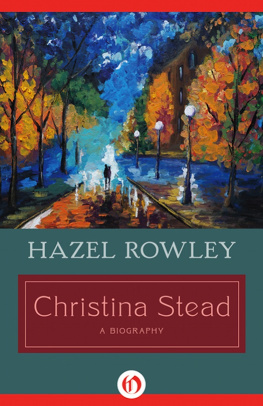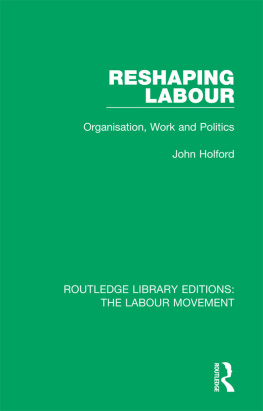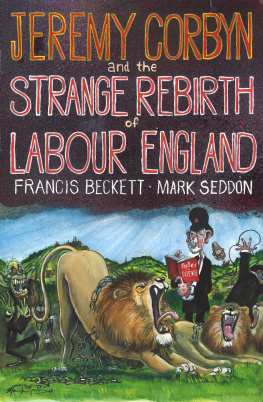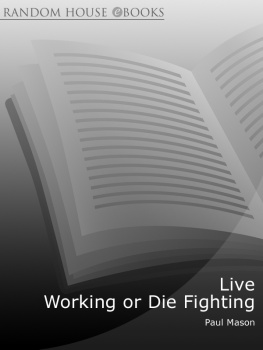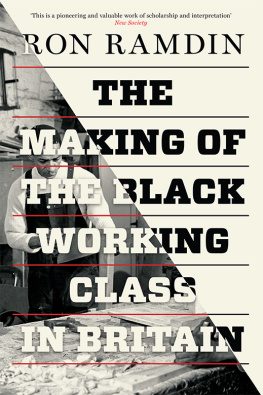Christina Stead - Cotters England
Here you can read online Christina Stead - Cotters England full text of the book (entire story) in english for free. Download pdf and epub, get meaning, cover and reviews about this ebook. year: 1966, publisher: Random House, Inc., genre: Art. Description of the work, (preface) as well as reviews are available. Best literature library LitArk.com created for fans of good reading and offers a wide selection of genres:
Romance novel
Science fiction
Adventure
Detective
Science
History
Home and family
Prose
Art
Politics
Computer
Non-fiction
Religion
Business
Children
Humor
Choose a favorite category and find really read worthwhile books. Enjoy immersion in the world of imagination, feel the emotions of the characters or learn something new for yourself, make an fascinating discovery.

- Book:Cotters England
- Author:
- Publisher:Random House, Inc.
- Genre:
- Year:1966
- Rating:3 / 5
- Favourites:Add to favourites
- Your mark:
- 60
- 1
- 2
- 3
- 4
- 5
Cotters England: summary, description and annotation
We offer to read an annotation, description, summary or preface (depends on what the author of the book "Cotters England" wrote himself). If you haven't found the necessary information about the book — write in the comments, we will try to find it.
Cotters England — read online for free the complete book (whole text) full work
Below is the text of the book, divided by pages. System saving the place of the last page read, allows you to conveniently read the book "Cotters England" online for free, without having to search again every time where you left off. Put a bookmark, and you can go to the page where you finished reading at any time.
Font size:
Interval:
Bookmark:
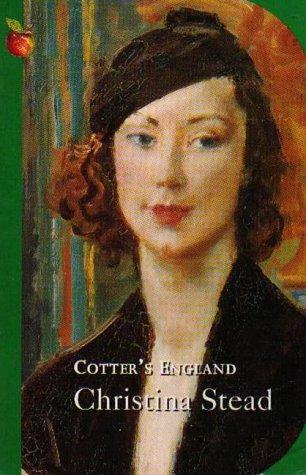
Christina Stead
Cotters' England
Introduction by Margaret Walters
This edition 1980
Copyright Christina Stead 1966
Introduction Copyright Margaret Walters 1980
ISBN 0 86068 128 9
For my Friends Anne and Harry Bloom
Introduction
I N COTTERS' ENGLAND Christina Stead creates one of the most remarkable heroines in modern fiction. Heroine may not be the right word. Nellie Cook, born Cotter, is a monster. Stead always an uncompromising writerrisks centering on a woman who is excessive, melodramatic, almost a comic caricature. Nellie alienates us at every turn. She is a self-proclaimed socialist whose politics are nothing but mystical waffle; noisily proclaiming her feminist loyalty, she exploits and betrays her closest women friends, even driving one to suicide. But Nellie springs off the page with a vitality that compels our attention. We respond more deeply to her, learn more through her, than a score of more conventionally sympathetic characters.
Almost forty, Nellie scrapes a living as a journalist on a left-wing London paper. Her editor is increasingly impatient with her "sobsister" prose, and her marriage to labour leader George Cook is breaking down. Anxious, lonely and ill, Nellie rushes frenetically from her job to the pub to political meetings, from her decayed Islington house to the Tyneside slum where her parents still live. She drinks, smokes, stays up all night coughing her heart out. And she talks. And talks, and talks. All Nellie's energy, all her frustrated creativity, pour into words. She never stops haranguing, arguing, wheedling, charming, complaining. She talks endlessly about the value of talk, insisting that her friends plunge with her into orgies of confession and introspection. Yet she has friends. For though she is absurd and pompous and pretentious, though her "perpetual outlandish chick, pet, sweetheart and her northern affectations" grate on the ear, Stead convinces us that she is indeed a spellbinder. Even her more distant acquaintances areat momentscaptured by the "inner melody of the northern voice and its unexpected cry, its eloquence".
Nellie prides herself on her realism, on a unique insight into human suffering born of her working-class origins. Anyone who views the world differently is dismissed out of hand. According to Nellie, her newspaper editor "tailors reality" to fit his socialist theory, her friend Caroline is lost in a bourgeois dream world, and her brother Tom drifts through life as a vagabond, a mountebank, a mere shadow of a man. Yet it is immediately obvious to the reader that it is Nellie who shrouds the truth in fancy words, Nellie who postures and play-acts, who glosses over anything which might puncture her sentimental rhetoric about the grand old days up north, or about her perfect marriage. Nellie knows nothing, her brother complains, about her friends or about herself. She is a hypocriteand at the same time she is engaged in a gallant attempt to re-make herself and the world she lives in. Stead takes her contradictions seriously, and still manages to view her ironically, with a sharp sense of her comic value.
Nellie's deepest feelings are all for her brother, Tom Cotter. Neither can bear the other, nor bear to let the other go. Locked together in a narcissisitic and sterile love rooted in adolescence, they are bitterly and accurately critical of one another, and of their own reflected selves. Nellie clutches jealously at her brother, competes with him, tries to monitor his relationships and to experience them vicariously, while he clings, resentfully and tenderly, to the older sister who had seduced him into drink and drugs and politics, who had formed him in her image. Unable to give themselves, unable to rest, both seek frantically for someone, anyone, who might fill and complete them; they are always driven back on each other. They share a sadistic adolescent pleasure in provoking emotions in others which they are incapable of experiencing in themselves. Each has fantasies of being a healer, a saviour; each brings pain and despair to those who love them. The novel is littered with their victims. At the very end of the book, George Cook's first wife, Eliza, who has tried to ignore the damage done to her by both Nellie and her callous brother, has a sudden shocking memory of her first impression of the "fatal" couple. Nellie is an "imp of Satan ... a mummer, a liar", and Tom a "curious being with a floating soul, neither man nor woman, and not human; neither of them human".
And Tom's deserted wife cries out angrily against his cold self-absorption. "He's walking by the mirror and looking in to smile, and coming back to you like a man out of a mirror, and he eats your heart away." And she is even more hostile to Nellie, who came between them, who even now, under the cover of affectionate concern, is "post-morteming for all she's worth, wringing the juice out of a corpse".
In one of the most chilling scenes in the novel, Nellie and Tom try to recapture their childhood intimacy by visiting the hall of mirrors at a country fair. They dance, "so there was a string of them in the dusty narrow corridor, a ballroom of the strangest people, but always the same two". They are amused, shaken, almost disgusted when they glimpse the truth of their own distorted reflectionsNellie is a "spindling hatchet witch" and Tom a "playing-card king". Stead's prose is riddled with images from folk or fairy stories, many of them grim and bloody. Richly realistic characters suddenly, jokingly, appear in more primitive guise as witches or ghouls or harpies. Nellie jealously asserts that Tom's many women friends consume him and suck him dry. But the metaphors of cannibalismof greed and insatiable appetite cluster around Nellie herself: she is the vampire, a figure at once comic and terrifyingly destructive. When she claims that her brother has no heart, he turns the phrase back on her in a brutal, physically literal way : "You took it from me and lived on it and now you're scurrying around from one body to another, hungry and thirsty, and you'll do anything to still the pain."
Nellie may plead, seductively and convincingly, for greater intimacy with her friends. In fact, she is avid to possess and devour them, to incorporate their lives in hers. She flaunts her sympathy with prostitutes and deserted wives, with all the pathetic women who are wronged by men, at the same time secretly enjoying the pain inflicted on other women by her brother and her philandering husband. And in the end she does more harm than either of them. The most vulnerable of her friends is Caroline, who is deeply depressed by a broken marriage. Nellie, overwhelming her with compassionate concern, makes impossible demands on her; she belittles the girl's uncertain attempts to write and to form new relationships and gradually undermines her fragile hold on life.
At times, her brother remarks, a demon or an evil spirit seems to be speaking through Nellie; and in a scary climactic scene, she talks Caroline into a belief that suicide is the only way out of her troubles.
The episode brings out all the power and the weakness in Stead's writing. The whole novel has prepared us to recognize and understand Nellie's fascination with death. Fantasies of death excite and restore her, and the idea of suicide, of violent death of any kind, seems to heighten her sense of herself. But when an over-heated Nellie begs Caroline to offer herself as a blood sacrifice so that she, Nellie, may find renewed life, the narrative trembles on the edge of absurdity. And the lesbian bacchanalia at Nellie's weekend party, which finally unhinges Caroline, works neither as realism nor as fantasy. Stead suddenly seems nervous of her material; the relationship between Nellie and her "Bohemian" friends is never explored, and the episode disintegrates into brilliant but obscure fragments, into unsupported hints at unspeakable corruption. What Stead
Next pageFont size:
Interval:
Bookmark:
Similar books «Cotters England»
Look at similar books to Cotters England. We have selected literature similar in name and meaning in the hope of providing readers with more options to find new, interesting, not yet read works.
Discussion, reviews of the book Cotters England and just readers' own opinions. Leave your comments, write what you think about the work, its meaning or the main characters. Specify what exactly you liked and what you didn't like, and why you think so.

